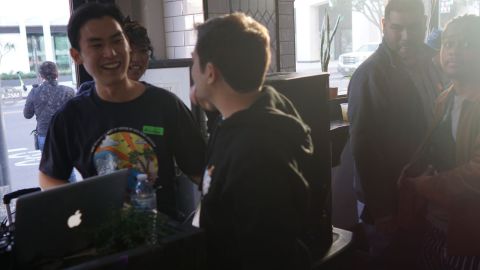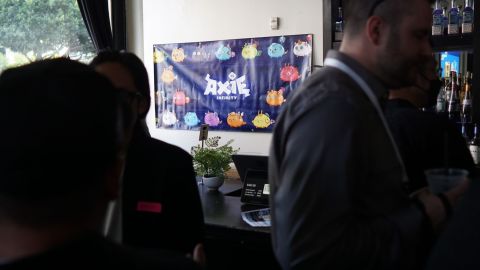Los Angeles
CNN Business
—
By all appearances, it was your typical tech party.
There was the branded swag, the free drinks and the mingling. But something was amiss at the Axie Infinity meet-up at Pattern Bar in Downtown LA.
Earlier in the day, Axie Infinity, the play-to-earn crypto game in which players collect digital pets known as “Axies,” had announced that the Ronin Network, the crypto network that helps power the game, was the victim of a hack of $625 million — a monumental amount, even in the era of mega crypto heists. The Ronin Network was developed by Axie Infinity publisher Sky Mavis.
Even worse, March 29, the day of the hack’s announcement, was supposed to be a banner day for the popular crypto company.
Jeff “The Jiho” Zirlin, Axie Infinity’s 31-year-old co-founder, was tapped to give the keynote address at the inaugural NFT LA that took over Los Angeles’ LA Live convention center. Axie Infinity fans and investors — the lines can be blurred with play-to-earn games, where the more you game, the more you earn in crypto — flew in from around the world to attend the gathering.
And yet 30 minutes before Zirlin went on stage, his company put up a blog informing the world of the hack.
“We realized the Ronin network has been exploited for 173,000 [Ethereum] and around 25 million dollars in USDC,” Zirlin announced to a stunned crowd during his keynote, under a screen with the words “State of the NFT Union: Where we are today and what’s next.”
And so hours later at Pattern Bar on Los Angeles’ Main Street, the big question on everyone’s mind: would Zirlin still attend?
Around 6pm, the crowd perked up as Zirlin entered the room wearing a snug black Axie Infinity hoodie.
“Jiho is here,” whispered one excited Axie fan as lollipops shaped as Axie creatures circulated.
Zirlin’s mood was noticeably more subdued than the partygoers surrounding him. In an interview with CNN, Zirlin said he was first informed of the hack at 2am that morning. He hadn’t slept since.
“Today was a hard day. It’s not good. It’s not the type of thing that we need as an industry to move forward,” said Zirlin. “It’s rough, man.”

Surrounding Zirlin, over nachos and complimentary margaritas, the Axie faithful mingled. Despite the shadow cast by the hack, there was a palpable excitement to the gathering.
When asked if they were concerned about their investments, many of the the assembled Axie crowd were zen about their holdings.
“I’m an optimist,” said Chris, who declined to give his last name, with a shrug.
“I think they’re going to recover,” said Vince Zolezzi, who told me that a quarter of his portfolio is in the Ronin network. “I think they’re going to find a way to get it back or if there’s insurance on it. I’m not personally worried about it. It’s going to be ok. … I have faith. They’ve gotten where they have for a reason.”
The company did not directly respond to CNN’s question on whether the hacked holdings were insured.
Many cited how common hacks in the crypto space are. Each one ends up becoming an expensive but necessary learning lesson, they said. Many said they believed that the funds will end up being recovered somehow.
But cracks in the good vibes emerged.

Brad Wenum stood with a drink in hand by the outskirts of the bar. He got into crypto in 2014 and had some of his early funds hacked — crypto valued at around $500 at the time, which he estimates would be worth a million dollars today. Wenum called Axie’s hack an “eye-opener” and said it made him question the emergence of companies taking on large roles in the crypto space, undermining the distributed nature of the system that attracted them in the first place. “It’s almost like, ‘Should I even be involved in this?’” said Wenum.
Omar, Pattern Bar’s hulking doorman, said he was initially surprised by some of the partygoers’ sullen attitudes until he learned about the hack. “When I found out what was going on I was like, ‘Damn! I’d be mad too!’”
Outside the party, employees of an Axie competitor couldn’t help but gloat over cigarettes.
“For us, it’s good. It’s going to sound horrible,” said Wesley Peeters CTO of Pixie Interactive, a company whose play-to-earn game will debut soon. “It’s a chance for us to slide in.”
After we first talked, Axie Infinity co-founder Zirlin found me and gave an additional unprompted explanation for his decision to come to the party amidst his company’s crisis.
“I had to come out. I told people I would be here. They came from all over the world, the Philippines…” he trailed off. “I’m not drinking or anything.”
The hack took place on March 23, almost a week before Zirlin says he was informed of it.
According to the company, the Axies themselves haven’t been stolen, but the bridge — the underlying assets that allowed you to convert the games proprietary tokens into Ethereum and then to cash — have been. In a blog on the technical aspects of the hack, software engineer Molly White likens Axie Infinity tokens to chips in a casino. They can be traded for cash, but not if the casino’s safe has been looted.
Now, because of the hack, trading off the Ronin platform is currently frozen.

Asked by CNN when users will be able transfer their Axies into Ethereum again, Zirlin declined to commit to a timeline.
“Not until we have everything right,” said Zirlin.
When asked if he thought that the hack could be an inside job, Zirlin didn’t hesitate. “No,” he said without providing more details. Zirlin also would not divulge why the company hadn’t discovered the hack until six days had gone by.
Could the company guarantee that users would not be affected? Zirlin paused and looked away.
“There’s no guarantees in crypto,” said Zirlin, who founded the company in 2018. “But we’ll do our best to figure it out.”
Shortly after his first interview, which was on the record and recorded, Zirlin asked if CNN could run his answers by his PR team before publishing. CNN declined the request.
The comparison Axie Infinity fans love to make is to Pokemon. You collect digital pets (Axies), which you can then take into battle against other players’ Axies.
But Axie Infinity added a new layer: play-to-earn mechanics. The more you play Axie Infinity, the more money you can earn from it. The money comes from people paying for Axies to play the game (you need to purchase or rent three Axies to begin playing) and gets paid out to those who earn tokens by playing the game.
Axie Infinity’s stunning growth earned its parent company, Sky Mavis, a $3 billion valuation with a $152 million investment from the blue-chip crypto venture capital firm a16z, according to The Information.

Right now, the hot topic for Axie Infinity fans is the impending launch of “Axie Infinity: Origin,” a new version of the game that will offer players the ability to purchase collectible skins for their Axies. Currently, the Axie Infinity subreddit and Discord are filled with questions on Origins’ release date, which has been delayed because of the hack.
As with other play-to-earn games, it can be hard to separate whether people are interested in a game because it’s fun or because it could make them rich.
And so, it’s often unclear whether the people hyping Origins are actually excited to play the game or believe that enough other fans are excited and going to spend enough money so the entire project will reach the much-fantasized dream of financial sustainability. If Origins is a hit, the logic goes, then gamers will pay for in-game items not to profit off of them, but for fun or in-game status, like countless gamers do in non-crypto video games like Fortnite.
At Pattern Bar, some said they were excited to play Origins; others talked about its release as the thing that will make the economics of the game sustainable.
But even if Sky Mavis and Axie Infinity recover from the hack and successfully launch Origin, there’s still the question of where the money generated from it ends up.
The hack isn’t Axie Infinity’s first brush with unwelcome attention.
Axie Infinity has a business model that some have heralded as providing opportunities to players in the developing world and others have harshly criticized as exploitative.
The game has proven to be a smash hit in the Philippines, where a controversial system has led to a complex web of players and overseers.
Because the game requires a person to own three Axies to begin playing (and earning), a barrier to entry that currently costs around $60 but at one point cost hundreds, the game allows users to rent out their Axies in what it calls a “scholarship.” “Scholars” borrow Axies from “Managers,” and then pay out a significant amount of their earnings. The split is up to the managers and scholars to decide, with a 50% split being common.
During the NFT boom of 2021, the wages from the game were so high that some Filipino players were able to earn enough to quit their jobs. But as interest in NFTs has dwindled, the once fat checks have now fallen below the Philippines’ minimum wage, according to research firm Naavik.
Axie’s boom in the Philippines has led to an industry of “guilds” that collect thousands of Axies to rent to a legion of Filipino scholars.

“We have 3,000 players playing multiple games for us,” said Alfonso Maputol, the CEO of the Play It Forward guild, whose scholars are almost entirely based in the Philippines and usually play six to seven days a week. Maputol, who flew in from Singapore for the Axie Infinity event, said he’s fired some of them for not playing enough hours.
“If you don’t play, we might take away your scholarship,” said Maputol, who told CNN he doesn’t personally play the game.
Stephen Diehl, a programmer and prominent crypto critic, has likened Axie Infinity’s business model to “digital serfdom.” When asked to respond to such characterizations, Zirlin refused to comment, calling it a loaded question.

“It requires a 20 to 30 minute response,” Zirlin explained.
Axie holders often bring up the Philippines as a case study in how the game isn’t just a fun app or a good financial investment but a moral good.
One Axie Infinity holder made the case with a notorious comparison.
“[Axie Infinity] has the most positive externalities of any Ponzi scheme in the world,” said Justin Seeley in the lobby of the NFT LA convention. Seeley has thousands of dollars invested in Axie Infinity, a game that transfers wealth, in his words, “from first-world speculators to third-world people.” Seeley clarified that his definition of a “crypto Ponzi” is different than the traditional one.
“It’s a good Ponzi … it’s growth based,” he said.
Kalie Moore, a spokesperson for Axie Infinity, rejected the Ponzi characterization, saying the game’s economy “does not rely on new users compensating earlier players,” and that it works “as long as players are interested in creating new Axies, but in the end, some players hold onto their Axies, because they love them as pets, see them as collectibles, or enjoy playing the games in the Axie universe.”
Moore said Axie Infinity’s forthcoming Origin update will “increase the long-term sustainability” of the game by increasing the amount of spending “that is based on fun and status.”
It’s unclear when, if ever, Axie Infinity users in the Philippines — or anywhere for that matter — will be able to cash out their earnings.
As the sun set, Albert “Aruchan” Takagi a Japanese Axie Infinity influencer, manned the DJ booth to run the Axie Infinity bingo giveaway.
There were Axies up for grab. Axie t-shirts. A trip to an upcoming Axie Tournament in Las Vegas organized by a new crypto company that calls itself the first “Party-to-Earn” platform (“a gamified party ecosystem.”) A blond guy went around the bar’s tables picking up discarded bingo cards, looking for hidden winners.
Outside of the event, Axie Infinity fans crowded around Zirlin, looking for any gossip and intel on the hack that he described as an “incomprehensible amount.”
Earlier in the night, when asked whether the hack makes him concerned for Axie Infinity’s future, Zirlin took a beat before responding.
“I don’t think so. I always have faith. Obviously we’re not in as good a situation as we were yesterday,” said Zirlin.
“This could be the type of thing that brings a community together. “
Source : CNN












